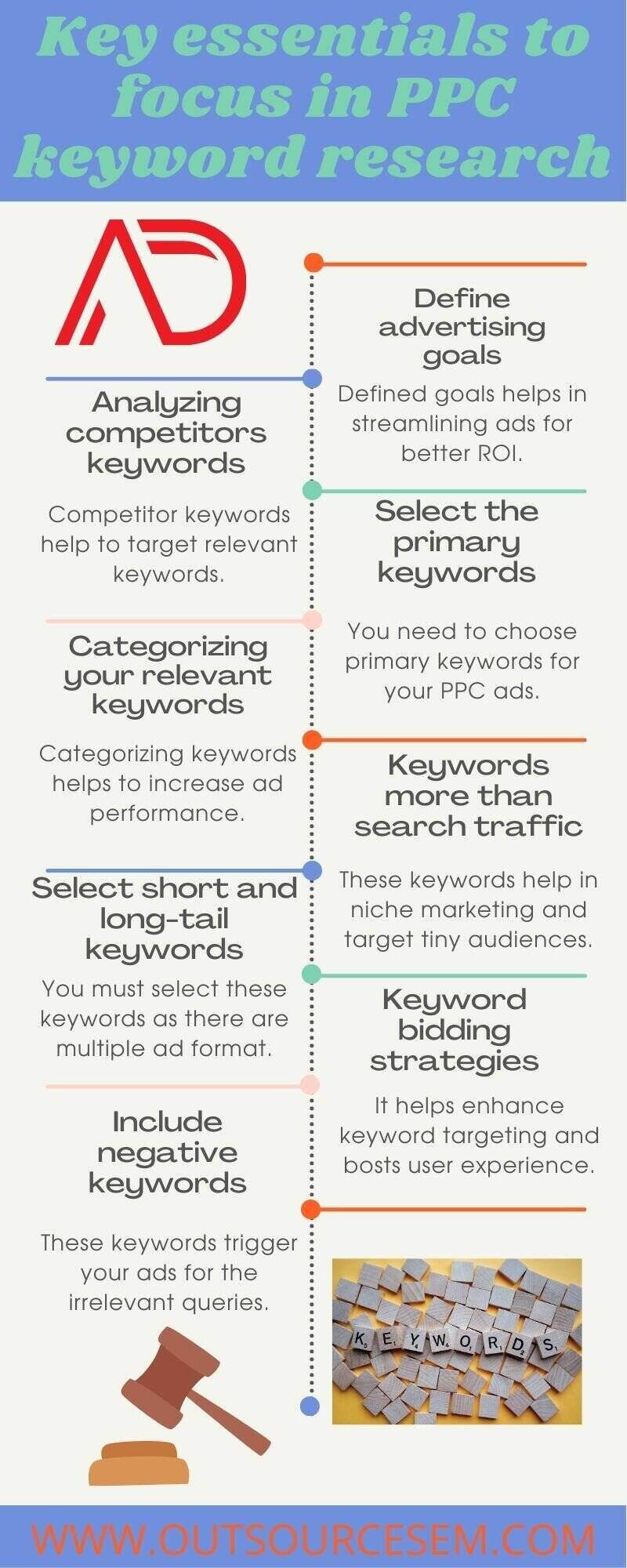When running PPC ads, wasting even one cent on an ad that does not perform well signifies that the ad performance needs to be enhanced. One of the ways to improve the performance of the PPC ads is choosing the most relevant keywords that attract potential users to the landing page. Whether running Google Ads, Microsoft Ads, Facebook Ads, LinkedIn Ads, YouTube Ads, Instagram Ads, etc., selecting the best-performing keywords is the cornerstone for the PPC ads to yield the desired advertising ROI. Conducting proper PPC keyword research not only helps to improve the performance of the but also helps save your ad budget from getting wasted on the irrelevant clicks. In this blog, there will be discussions on the key essentials that need to be focused on when conducting PPC keyword research. It will help you acquire, refine, and organize the keywords to run better-targeted and effective PPC ads.
Importance of PPC keyword research
Keyword research is the foundation stone of running PPC ads that yield the desired advertising ROI. In the digital marketing world, when running PPC ad campaigns, you must choose search terms or phrases that you wish your PPC ads to appear. With a wide range of keywords, you need to be specific in selecting the keywords that drive conversions and avoid the keywords that are irrelevant to your ads.
Keyword research is essential as it helps to choose industry-specific terms and phrases. It helps to understand your audience and the queries they search on the search engine. With the keyword research process, you have keywords that match the users’ search intent and the landing page content. You need to focus on ad relevance so that the bounce rate of your PPC ads decreases. When the keyword research process is executed well, you get to have better ad rank & position for the relevant keywords or search terms and stay ahead of your keywords.
Key essentials to focus in PPC keyword research

1. Advertising goals - When beginning to advertise with PPC ad campaigns or have been running paid ad campaigns, you need to be aware of the advertising goals. Different businesses have different advertising goals and vary according to the nature of the business. The advertising goals of the businesses can be different, like increasing quality traffic on the landing page, increasing click-through rate, boosting conversion rate, building brand awareness, lead generation, etc.
Whether you are using any form of digital marketing to achieve the desired goals, like running paid ad campaigns, using search engine optimization techniques, content marketing, email marketing, etc., you need to be aware of the goals you wish to achieve. Similarly, with paid ad campaigns, you need to be aware of the goals you wish to achieve from running paid ad campaigns. Having defined advertising goals helps save your ad budget and target the relevant target audience. There are myths surrounding PPC advertising, but you can achieve the desired return on investment with a clearly defined advertising goal.

2. Analyzing competitors keywords - The next essential point to consider when conducting PPC keyword research is to analyze the competitor's keywords. When running SEO campaigns or PPC campaigns, performing competitor analysis is a very crucial part. It is essential to know what alterations competitors are performing. This can be known by performing a PPC campaign analysis. When you perform a PPC audit, you get to know which keywords competitors use and how relevant they are to your business. After you know which keywords your competitors are targeting, you can consider preparing a keyword list that provides you with a complete idea of whether you need to include them in your keyword list.
Be it any form of online marketing like social media marketing, email marketing, content marketing, etc., it is very essential to know which keywords the competitors are targeting. A data-driven PPC report or SEO report helps to know this, and tools, such as Google Ads, etc., can be used for this. Analyzing the competitor keywords helps to know which keywords users are searching for in the search engine. You can then use these keywords to create PPC ads that help in outranking the competitor's ads. You can use these to work on writing unique content, ad copies, using ad extension, etc., that grabs the audience into making a click on the PPC ad.
3. Select primary keywords - The next essential point to focus on in PPC strategy is to focus on selecting the primary and secondary keywords. The better the keywords are chosen for the ad campaign, the higher the chances of the PPC ads appearing higher on the SERPs. With such a wide range of PPC keywords to be included in the PPC campaign list, selecting the primary and secondary keywords is essential.
In paid search campaigns, it is essential to determine which keywords need to be more focused on in keyword bidding and which keywords can be done with less bidding amount. You need to focus on choosing the primary keywords, as these keywords have a high chance of driving quality traffic to the landing page. The secondary keywords are essential as they assist the ad campaign for any search. When you have exact match keywords in your ad campaign, then only specific users can see the ads for the search queries entered. This is beneficial for businesses that deal with specific products or services. However, for businesses dealing with e-commerce PPC ads, secondary keywords are useful. When these e-commerce PPC ads include broad match and phrase match keywords, the secondary keywords are helpful as they match the user's search intent.
4. Categorizing your keywords - The next essential point that you need to focus on is categorizing the keywords. When working on PPC keyword research, you need to clearly define the specific keywords that you need to put under categories like exact match, phrase match, broad match, etc. When preparing the relevant ad groups and adding the keywords for the same in the ad campaign, you need to clearly mention the keywords you wish to put in which category.
As in search engine optimization, you focus on categorizing the web pages, SEO pagination, site structure, etc., on easing the user navigation on the website. In the same way, when you categorize the keywords in your PPC campaign, then the search engines easily identify what search results to show to the users for the keywords or search terms entered. It helps to easily target the relevant audience with a high chance of taking the desired action. To improve the performance of SEO campaigns as you focus on conducting SEO keyword research, on-page & off-page SEO, creating unique content, updating content regularly, URL structure, using alt tags, writing eye-catching meta descriptions, etc. In the same way, you need to focus on categorizing the keywords that help drive quality traffic to the page and boost advertising ROI.

5. Select keywords more than high search traffic - When running PPC ads, search traffic is not the only point that needs to be targeted by the advertisers. In the PPC ads campaign, many PPC metrics affect the ad's performance. It is better to target the keywords with high search volume, but at times using low search volume keywords is also beneficial for your business.
There is a difference between zero search volume keywords and keywords with low search volume. The low search volume keywords provide a unique opportunity to target topics that are highly relevant to the audience. These keywords help in niche marketing and target the tiny audiences that are relevant to your business. Many a time, it is also a point that zero search volume keywords produce the desired results. However, you need to be very specific in keyword analysis and select the keywords smartly. You can also outsource PPC services as the PPC experts have experience in selecting the low search volume keywords(if needed) and can differentiate between generic, branded, and non-branded keywords.
6. Short and long-tail keywords - The next essential point that you need to focus on is using short and long-tail keywords. When conducting PPC keyword research, you must use short and long-tail keywords. As there are multiple ad formats available in the PPC ad campaign, you need to focus on selecting the short and long-tail keywords that you can use to reach the potential target audience.
The short tail keywords are the keywords that generally contain 1-3 terms and cover broad topics. These help increase landing page traffic, build brand awareness, etc. The short tail keywords have higher search intent and attract more website visitors. In general, these keywords are most searched by users, which accounts for the higher search volume of these keywords. As today's users are impatient, they cannot wait long to get the results displayed after entering the keywords or search terms. So, it becomes essential to optimize ads for mobile devices, as it is vital to optimize the website for mobile devices. Some of the benefits of using short-tail keywords for your PPC campaigns are:
• Higher search volume.
• Appeals to a broad range of audiences.
• Easier to be used in the ad campaign.
Long tail keywords are long terms or phrases that are more specific keywords and are used by consumers when looking for specific products or services. When you work on touching the unique selling point of the target audience, you can consider including these in your PPC ad campaigns. This helps in increasing the specific audience on your landing page. You can consider adding attractive discounts & offers so that the target audience takes the desired action after clicking on the ad and reaching the landing page. Some of the essential benefits of long tail keywords are:
• Long tail keywords are more specific
• Reach the more targeted audience
• Comparatively less competitive (than short tail keywords), so it has a higher ad rank & position.

7. Keyword bidding - In the PPC advertising world, the essential point that you need to focus on is keyword bidding. With such a wide range of audiences present on search engines, social media platforms, etc., you must bid on the relevant keywords. In the keyword research tool, you need to identify the keyword search volume and the search intent clearly.
Keyword bidding is an essential component of PPC campaigns. It is vital as it helps in enhancing keyword targeting and ad creativity and boosts user experience. You need to focus on keyword bidding as it helps improve ad rank & position for the relevant keywords or search terms entered by the user. When bidding on keywords, you need to focus on essential PPC keywords that affect the performance of the PPC ads. To cut the keywords' cost, you need to consider the keywords based on their goals. Some of the PPC metrics that you can consider based on which you can bid on keywords are listed below.
• Conversion-based keywords - conversion rate, search impression share, search rank lost impression share, number of clicks, average CPC.
• User-engaging keywords - bounce rate, quality score, impression share.
When bidding on the essential keywords, the prime focus is choosing the relevant keywords you bid on at a low cost. However, there are chances that there are users that, at times, convert at a higher rate but have high chances of staying in touch with the business in the long run. So, you need to clearly perform keyword analysis so that it eases your process of selecting the relevant keywords. To work on keyword bidding to achieve the desired advertising goals, you can also outsource PPC services and get the work done by certified PPC professionals.

8. Include negative keywords - The next essential point that you need to focus on in your PPC keyword is to include negative keywords. The negative keywords are crucial to be included in the paid search campaigns as it helps your PPC ads from appearing to irrelevant search queries. As in Google PPC ads, there are three types of keywords to be included in the keyword list. These are exact match keywords, phrase match keywords, broad match keywords, etc.
Whether you are running e-commerce PPC ads, display ads, video ads, text ads, etc., you need to ensure that the negative keywords are included well in the paid search ad campaigns. You need to conduct keyword analysis to determine which keywords are to be put in the negative keywords. In the keyword research tool, you can enter the seed keyword and then identify the relative keywords that need to be put in the negative keywords list. These keywords help only the relevant target audience reach your landing page with a high chance of taking the desired action.
Bottom line
Paid campaigns require money to be paid to the search engines for every click received on the PPC ad. Conducting keyword research for PPC ad campaigns becomes essential, and thus the more relevant the keywords to your ad campaign, the higher the chances of the user to take the intended action on the landing page. PPC keyword research is vital in running PPC ad campaigns, as most of the points in running PPC ads revolve around selecting the relevant keywords. The more relevant the keywords are to the ad campaign, the higher the chances of the essential PPC metrics performing better. Using keyword planner tool you can choose the relevant keywords that bring traffic to the landing page. The Google keyword research is an essential step that helps in selecting the relevant keywords that rank on the search engine. With a proper PPC ad optimization strategy, you can improve the PPC ad performance and choose the relevant keywords based on the PPC trends, marketing trends, etc. If you find conducting PPC keyword research a tough task to perform, you can outsource PPC services to a digital marketing company. The PPC professionals have years of experience working on local service ads, PPC reports, PPC audit, etc. Outsource PPC services to the PPC professionals and have a value for every cent spent on the PPC ads. Moreover, if you are operating in other industries as well, our PPC agency is best in providing various other online marketing services like electrician PPC, flooring PPC, roofing PPC, lawyers PPC, small business PPC, and much more that can significantly benefit from well-executed PPC campaigns. By conducting comprehensive keyword research and optimizing their PPC advertisements, these businesses can enhance their online presence, draw in prospective clients, and attain better returns on investment.
References:
• PPC keyword research guide: how to find the words for your paid search campaigns
• PPC guide: keyword research and match types
